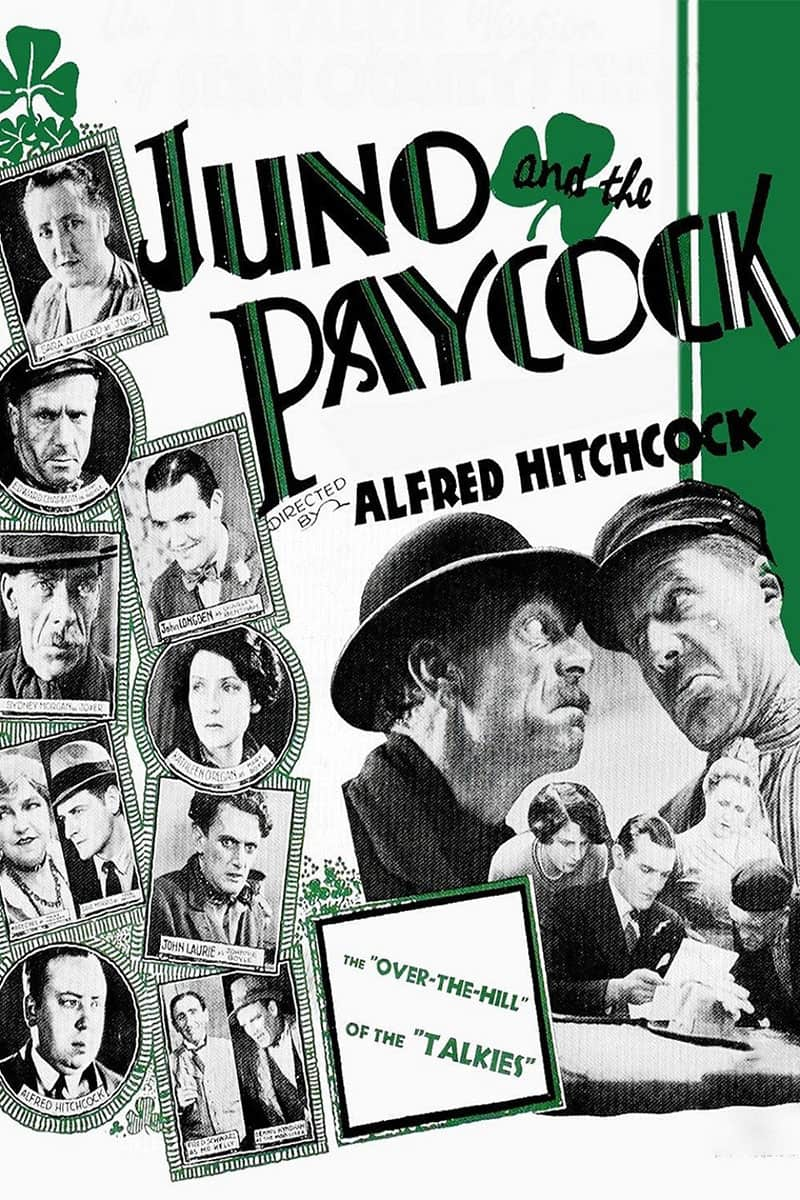Juno and the Paycock (1930)

Not every Hitchcock is a Hitchcock
A film directed by Alfred Hitchcock - it's going to be good, isn't it? It's going to be full of suspense and mystery, right? That's what I thought when I saw that Juno and the Paycock had Hitchcock's name attached to it. Instead, it's purely a stage play on film. I'm convinced that he probably rocked up at a theatre with a camera and a microphone and just filmed whatever was on that day.
The film is about the trials and tribulations of Juno and her family. Juno (Sara Allgood) is married to the workshy "Captain" Jack Boyle (Edward Chapman), who develops mysterious leg pains whenever the suggestion of employment gets raised. His only experience of being a captain is going on a boat to Liverpool. Juno refers to him as a paycock (peacock) as he likes to exaggerate his achievements and self-importance. He spends most of the film gurning and puffing out his stomach peacock-style to make this point. When he's not doing that, he's boozing it up with his drinking pal, Joxer, either at home or in the pub. Living with Juno and Jack in their cramped tenement flat in Dublin is their son Johnny (John Laurie) and daughter Mary (Kathleen O'Regan).
The film takes place during the Irish Civil War in the early 1920s. Johnny spends much of his time sulking emo-style in front of the fireplace. The rest of his time he's either angry, emotional or paranoid. Johnny lost his arm fighting in support of the IRA, so his moodiness is understandable. His paranoia is also understandable after it's revealed that he informed of the whereabouts of an IRA comrade to the enemy, who subsequently murder him. As punishment for this betrayal, Johnny fears that the IRA could come-a-knocking at any point to execute him. Mary is also a tragic figure. Although she has an admirer in the form of Jerry Divine, she prefers the seemingly more appealing Charles Bentham. Bentham is studying law and worms his way into the family by proposing to Mary and also telling them that they've inherited some money. The news delights the family, especially Juno, who becomes even more of a cock, sorry, peacock, than he was before.
Sadly, there is no money. Bentham was either a rubbish lawyer or a conman, or both. And Paycock Jack, who has blown money he didn't even have on stuff, finds that his debtors want their money or their goods back. Even worse, Bentham has got Mary pregnant. And he's buggered off to who knows where. Back then, being an unmarried pregnant woman was a disgrace. The family lose all their possessions, everybody - Joxer included - turns against Jack, Juno decides she's best off without him, Mary's a fallen woman. And Johnny does get a visit from the IRA and his worst fears come true. It's a bit like an episode of Mrs Brown's Boys. Only funnier.
The first half of the film is better than the second. It's a lot lighter in tone, and actually quite humorous in parts. The bickering between Juno and Jack is entertaining. There's also a scene when Juno goes out to work (for ten minutes it seems. What does she do?), and Jack, who has just refused Juno's offer of a sausage for breakfast out of pride, decides to cook it and share it with Joxer for lunch. Although Juno gets the sausage, Joxer gets the fat it's been cooked in. Joxer is clearly nervous about Juno turning up, and when she does, he scarpers out of a window and Jack hides their lunch - tea pots and all - in a cupboard. It's one highlight at least.
There's an awful lot of talking in the film, but very little action. It's not soap opera style talking, where conversations actually move the plot on. There's a lot of pontificating about the Irish situation at the time, even discussions about theology and philosophy. It can be quite heavy going. Around half-way through the film, after the family inheritance is revealed, and all looks like everything's going to turn out great, there's a sing-song. Jack, Juno, Mary, Charles, Joxer, some random woman from the pub, belt out their best performances of Irish songs. Meanwhile Johnny contemplates his favourite shade of black while staring at the stove. It kind of puts a bit of a break in proceedings, although in a way, it's probably what households back then actually did, especially working class ones. But, when it's revealed there's no inheritance, Mary is with child, and the IRA want Johnny, that's when all of the doom and gloom starts. The film just becomes lengthy speeches of lament one after the other, delivered in over-the-top melodramatic theatrical style. It might actually have worked at the time, as watching a play on film was a viable, and cheaper, alternative to watching it in a theatre. But, it doesn’t hold up as a watch today. The acting is alright in theatrical terms, but judged on it being a film, which would usually require a more natural performance, it really isn't great. Of course, this was made in the very early days for spoken cinema, so a lot of movies hadn't yet got into the groove of how they should be done.
Of course, Alfred Hitchcock would go onto achieve much greater glory. There's nothing really wrong with how this was directed, but there probably isn't much that could be done with it being predominantly set in the living area of the family's home. Sometimes it just comes down to source material. When there are changes of camera angle, it's a very obvious cut with no natural continuity of the scene. The play on which this is based is still fairly well-known today - it appears in secondary school exam papers occasionally, so the film might still be worth viewing just for that. Otherwise, it's not one I can really recommend.